15 Best Healthy Foods To Eat At Night, Recommended By Ayurveda
If you can't curb your late-night binge eating habits, at least switch to these foods

Image: Midjourney/ StyleCraze Design Team
Eating at night can have a direct effect on your mind and body. It is very important to practice mindful eating at night. It is crucial to track the late night eating effects on the body and mind. It is not just what you eat but the timing also is what matters to ensure your body functions properly (1). One must work on effective strategies to avoid eating at night and be very particular about late night eating and food choices.
The morning breakfast is termed the most important meal of the day by dietitians (2). It is your first meal of the day after a 6-8 hour gap. However, other meals, like lunch and dinner, are also important and should not be skipped. More importantly, skipping any of these meals will not help you lose weight, as is commonly believed.
Ayurveda tells us to be careful about what we eat at night. It’s the last meal of the day, and it is important to consume it at the right time and consume less oily and easily digestible foods that are low in calories.
This is because the end of the day is dominated by Kapha – and the food you consume must balance Kapha and not increase it. Continue reading to know what to eat at night.
In This Article
Foods That Increase Kapha Dosha
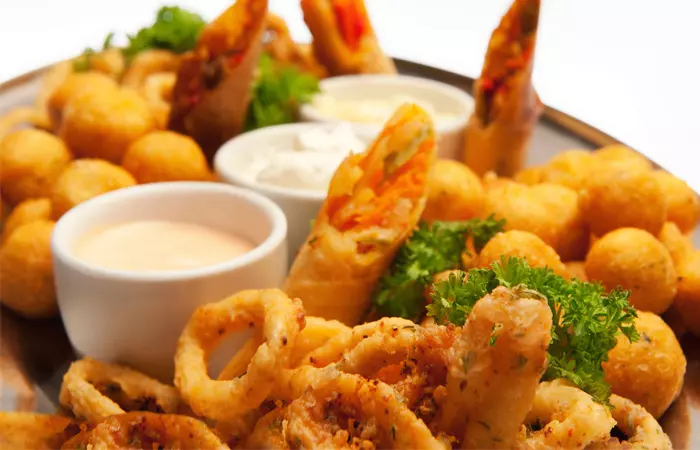
There are a few foods you must avoid eating at night since they create an imbalance in the kapha dosha. Junk food, oily food, certain non-vegetarian items, frozen food, heavy-to-digest food, curd, or ice cream are a few things that you must avoid eating during night time. Nighttime eating and nutrient absorption gets adversely affected. So, even if you eat them, try to have them in less or limited quantities. Eating more of them during the night may create an imbalance in the body and lead to complications like:
- Weight gain
- A runny nose when you wake up in the morning
- Cough and cold. If you are already suffering from a cough and cold, chances are the condition will worsen
- Vomiting sensation
- Indigestion
- Excessive salivation in the morning
- Allergies
Eventually, wrong eating habits can lead to the formation and accumulation of toxic substances in the body, which can cause several health complications. Also, late night eating and energy levels are correlated. You can see a major drop in energy due to the ill-effects of eating late in the night.
Eating at night is also connected to high blood sugar levels and can hamper good health. Therefore, it is best to be very mindful of what and how much you eat at night. Late night eating and insulin levels are interrelated to each other aswell, and may enhance the risk of severe health disorders.
Late night eating and heartburn is another negative impact that one can face due to eating too close to bedtime. Eating before bedtime and indigestion is something that can be extremely problematic to digestive health.
 Did You Know?
Did You Know?If you’re suffering from any of the above complications, it’s high time you start taking proper care of yourself. Sometimes, a slight adjustment in your diet pattern can cure or improve most of these conditions. So, the next question that arises is what type of adjustments can improve your health.
Eating at night can be one such adjustment. Let’s look at its benefits in detail in the next section.
Key Takeaways
- Junk food and a heavy dinner can lead to weight gain, indigestion, and even toxin accumulation in the body.
- There are different effects of eating at different times of day which should be understood well.
- Keep your dinner light on the stomach and reduce salt and sugar content in your food.
- Have your dinner at the right time and do not skip it.
- Include spices, ginger, leafy vegetables, and dal in your meal.
- Replace curd with buttermilk and have warm, boiled, low-fat milk at night.
Benefits Of Eating Before Bed
The impact of eating before bedtime on weight and health is debated. Heavy nighttime meals can be problematic and may cause digestive issues, especially for those who prefer a heavier meal at night. However, recent research suggests small, nutrient-rich snacks at night may be beneficial for health, especially when combined with exercise. Consuming small, nutrient-dense snacks before going to bed appears safe, particularly when limited to around 150 calories. It may boost muscle protein synthesis and your cardiometabolic health. Moreover, consuming foods rich in tryptophan or melatonin (like whole grains, legumes, and oats) may help improve your sleep quality (3), (4). Check out the next section to learn more about foods you can eat at night.
What Things To Eat At Night?

Late night eating and ghrelin (hunger hormone) levels may see a severe upsurge. Late night cravings and emotional eating are somehow connected to each other and may adversely affect your overall health. Plus, they can mess with your beauty sleep if you are not careful.
So, you must be wondering what can be healthy things to eat at night, right? Here are some simple tips for dinner:
- It is suggested to eat food that is easy to digest at night. Try to eat a healthy and low-carb diet as it gets digested easily. If you are seeking home remedies for insomnia, consider incorporating foods that promote relaxation and improve sleep quality.
- If you have the habit of eating curd at night, replace it with buttermilk. Prefer chapatis over rice since chapatis are easy and quicker to digest.
- Do not overstuff yourself. Eat in limited quantities
- Try to include more dal, green leafy vegetables, curry leaves, and a small amount of ginger in your meal.
- Salt is supposed to increase water retention in the body (5). Hence, it is better to cut down on the intake of salt.
- Spices, on the other hand, increase warmth in your body, so try to include spices in your food (6), (7).
- Reduce the sugar intake and replace it with honey as it helps in reducing the mucus (8).
- If you have the habit of drinking milk before you sleep, prefer low-fat milk. Always boil the milk before drinking it. This makes it easier to digest. You can also add a small amount of ginger or cardamom to the milk before boiling it, which helps in reducing the mucus generating properties.
- Do not drink cold milk. Have it while it is still warm.
The thumb rule you must follow while having your dinner is to make sure that whatever you eat, you should not get a feeling of heaviness in the stomach. Instead, your stomach must feel light so that you can sleep properly. There is a negative impact of late night eating on sleep quality.
 Quick Tip
Quick TipTips For Mindful Late-Night Eating
By practicing mindful eating at night, you can improve your sleep quality, support your digestive health, and maintain a healthy weight. Follow these mindful late-night eating tips.
- Try to eat your last meal a few hours before bedtime to give your body time to digest.
- Opt for foods that are easy to digest and may help you relax, such as chamomile tea or a small bowl of oatmeal.
- Avoid eating in front of screens or while multitasking. Focus on the taste, texture, and aroma of your food.
- Pay attention to your hunger and fullness cues. Stop eating when you feel satisfied, not stuffed.
Infographic: 5 Healthy Late Night Snacks That Can Help You Sleep Better
Staying up at night and eating anything can adversely affect your health. Late night snacking and digestion do not gel well together. Late night eating and snacking habits can ruin good health in the long run. However, if you choose the right, healthy late night snacks to satisfy your nighttime hunger pangs, you may not get into trouble and reap some health benefits in the bargain. Check out the infographic for some low-calorie, healthy, and tasty snacking ideas that can help you deal with nighttime eating and food cravings. Scroll down.
Some thing wrong with infographic shortcode. please verify shortcode syntax
Nighttime eating and weight gain go hand in hand. So as you see from above, there are high chances that eating at night can make you fat. With barely enough physical activity at night, your body requires very less energy at night. And the excess food, instead of getting converted into energy, gets accumulated as fat leading to obesity or weight gain. The ancient Ayurvedic knowledge, as well as modern science suggests having light food at night early on. Incorporating tryptophan-rich foods into your early, light dinner might help improve your sleep quality while also boosting your metabolism. Making it a habit to eat early and light at night would help improve your metabolism and make you feel light and healthy. How eating at night affects metabolism should be monitored as well and ways to curb this habit should be added in the regime.
Frequently Asked Questions
Is it okay to go to bed hungry?
No. Going to bed hungry is bad for your health. The hunger pangs will lead to sleep loss and make you feel lethargic the next day. However, eating heavy is not good for your health either. The key to maintaining healthy body weight and getting proper sleep is to consume a light meal at night.
Why should we not eat apples at night?
No concrete studies suggest that eating apples at night could be beneficial or harmful. As long as your last meal before bed remains light, you may eat apples.
Is it bad to drink water before bed?
No. Drinking water has a number of benefits, regardless of what time of the day it is. In fact, dehydration affects how your body reacts to temperatures, so drinking optimum water before bed is good for your health. However, drinking excess water can disrupt your sleep. It can also lead to a condition called nocturia, where you have to wake up frequently in the middle of the night to urinate. In such a case, stop drinking water 1-2 hours before bedtime.
Are eggs good before bed?
Yes. Having eggs before bed can be good. Although eating before bed and digestion don’t go together, eggs are quite a favorable thing as they are easy to digest. Their vitamin D, tryptophan, and melatonin content aid better sleep. They are a commonly recommended remedy for people struggling with sleep.
Illustration: Best Healthy Foods To Eat At Night, Recommended By Ayurveda
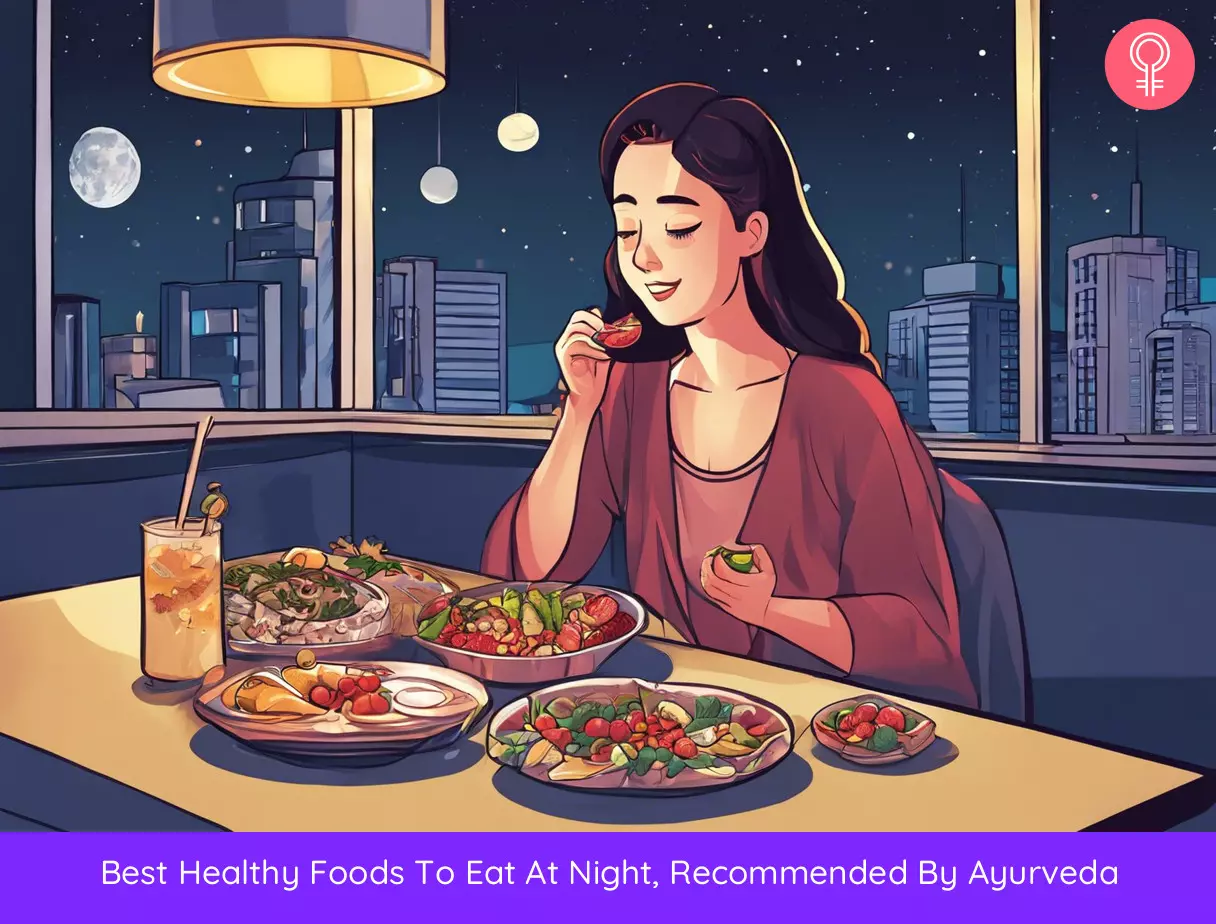
Image: Stable Diffusion/StyleCraze Design Team
Embark on a journey towards clean and healthy eating. Check out this video to discover the wisdom of Ayurveda and learn practical tips for nourishing your body and mind through mindful food choices.
References
Articles on StyleCraze are backed by verified information from peer-reviewed and academic research papers, reputed organizations, research institutions, and medical associations to ensure accuracy and relevance. Read our editorial policy to learn more.
- Timing of Breakfast Lunch and Dinner. Effects on Obesity and Metabolic Risk
https://www.ncbi.nlm.nih.gov/pmc/articles/PMC6893547/ - Breakfast in Human Nutrition: The International Breakfast Research Initiative
https://www.ncbi.nlm.nih.gov/pmc/articles/PMC5986439/ - The health impact of nighttime eating: old and new perspectives
https://pubmed.ncbi.nlm.nih.gov/25859885/ - Sleep and Diet: Mounting Evidence of a Cyclical Relationship
https://pubmed.ncbi.nlm.nih.gov/34348025/ - Salt and water not so simple
https://pubmed.ncbi.nlm.nih.gov/28414294/ - Pepper and cinnamon improve cold induced cognitive impairment via increasing non-shivering thermogenesis; a study
https://pubmed.ncbi.nlm.nih.gov/30208750/ - Hyperthermic Effect of Ginger (Zingiber officinale) Extract-Containing Beverage on Peripheral Skin Surface Temperature in Women
https://www.ncbi.nlm.nih.gov/pmc/articles/PMC6196930/ - Honey for treatment of cough in children
https://www.ncbi.nlm.nih.gov/pmc/articles/PMC4264806/
Read full bio of Reda Elmardi
Read full bio of Shaheen Naser
Read full bio of Arshiya Syeda
Read full bio of Himanshi Mahajan









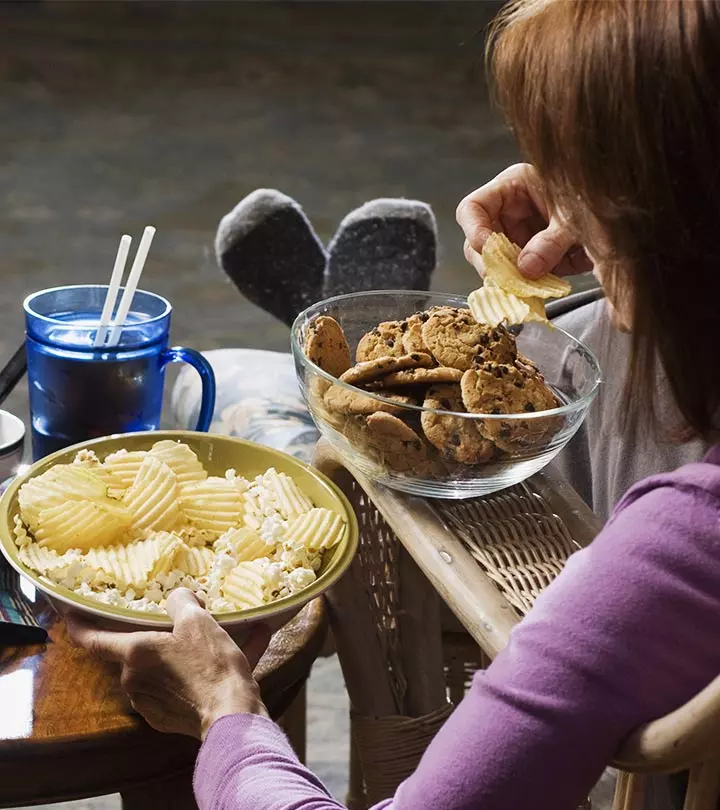


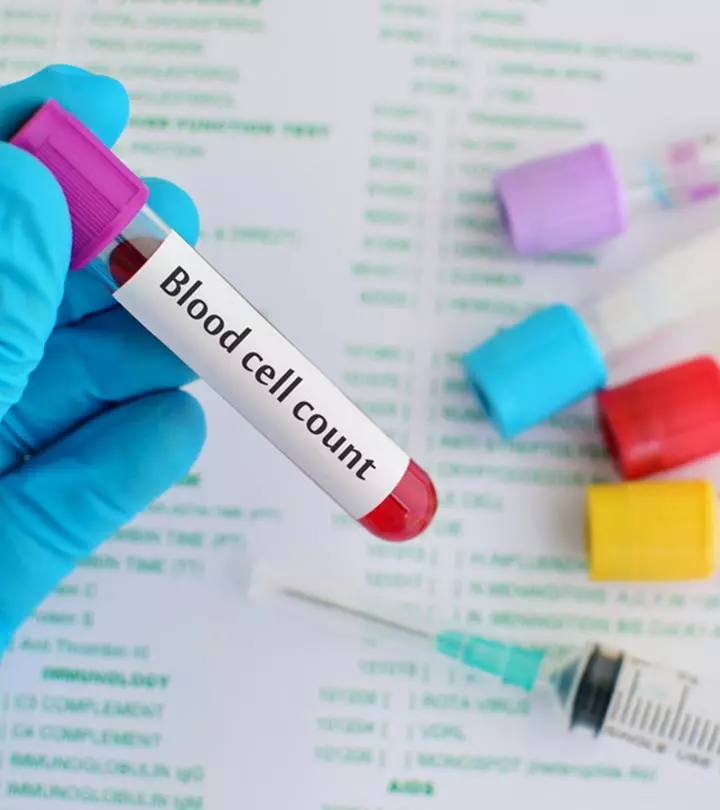
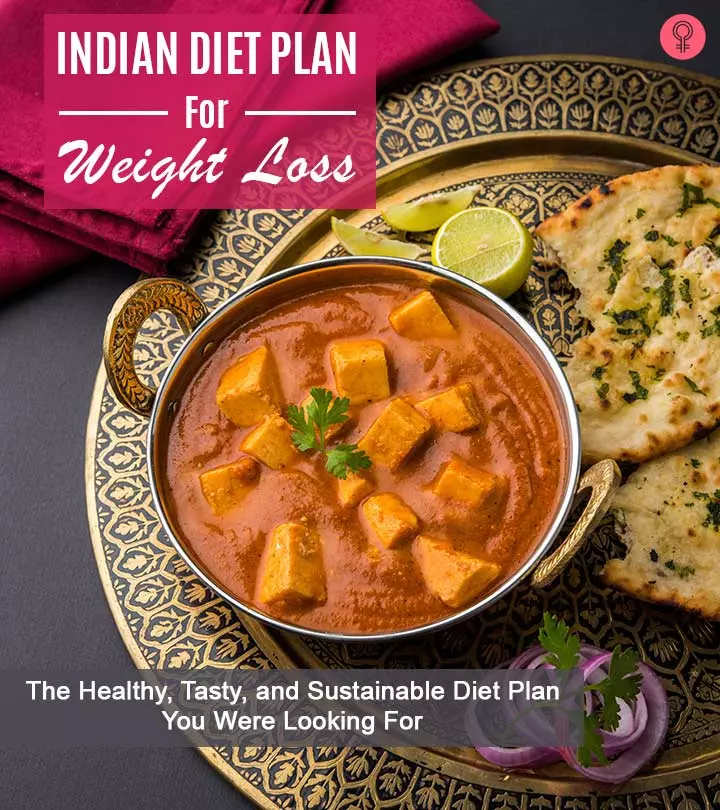



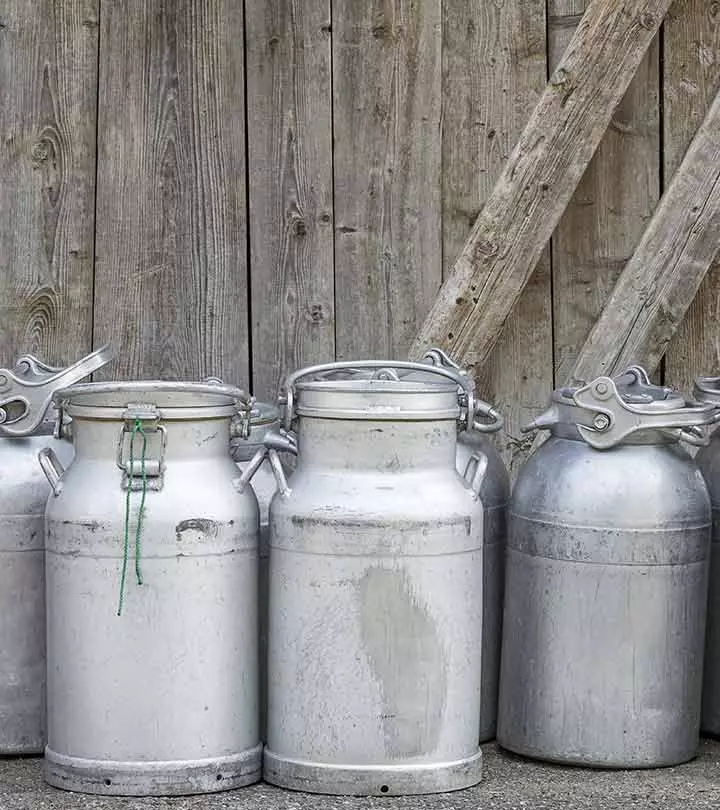





Community Experiences
Join the conversation and become a part of our empowering community! Share your stories, experiences, and insights to connect with other beauty, lifestyle, and health enthusiasts.